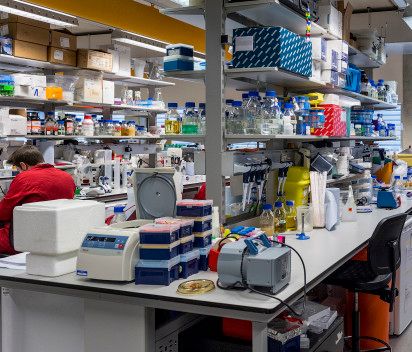Results
- Showing results for:
- Reset all filters
Search results
-
Journal articlePean CB, Dionne MS, 2014,
Intracellular infections in <i>Drosophila melanogaster</i>: Host defense and mechanisms of pathogenesis
, DEVELOPMENTAL AND COMPARATIVE IMMUNOLOGY, Vol: 42, Pages: 57-66, ISSN: 0145-305X- Author Web Link
- Cite
- Citations: 11
-
Journal articleBarraud N, Moscoso JA, Ghigo J-M, et al., 2014,
Methods for Studying Biofilm Dispersal in <i>Pseudomonas aeruginosa</i>
, PSEUDOMONAS: METHODS AND PROTOCOLS, Vol: 1149, Pages: 643-651, ISSN: 1064-3745- Author Web Link
- Cite
- Citations: 26
-
Journal articlePercy MG, Gruendling A, 2014,
Lipoteichoic Acid Synthesis and Function in Gram-Positive Bacteria
, ANNUAL REVIEW OF MICROBIOLOGY, VOL 68, Vol: 68, Pages: 81-100, ISSN: 0066-4227- Author Web Link
- Cite
- Citations: 253
-
Journal articlePader V, James EH, Painter KL, et al., 2014,
The Agr quorum-sensing system regulates fibronectin-binding but not hemolysis in the absence of a functional electron transport chain.
, Infection and Immunity -
Journal articleJones C, Filloux A, 2014,
Gene Amplification and qRT-PCR
, PSEUDOMONAS: METHODS AND PROTOCOLS, Vol: 1149, Pages: 457-468, ISSN: 1064-3745- Author Web Link
- Cite
- Citations: 1
-
Journal articleMuhl D, Filloux A, 2014,
Site-Directed Mutagenesis and Gene Deletion Using Reverse Genetics
, PSEUDOMONAS: METHODS AND PROTOCOLS, Vol: 1149, Pages: 521-539, ISSN: 1064-3745- Author Web Link
- Cite
- Citations: 13
-
Journal articleFilloux A, Ramos J-L, 2014,
Pseudomonas Methods and Protocols Preface
, PSEUDOMONAS: METHODS AND PROTOCOLS, Vol: 1149, Pages: V-V, ISSN: 1064-3745- Author Web Link
- Cite
- Citations: 5
-
Journal articleFilloux A, 2013,
Fit and resistant is a worst case scenario with bacterial pathogens
, PROCEEDINGS OF THE NATIONAL ACADEMY OF SCIENCES OF THE UNITED STATES OF AMERICA, Vol: 110, Pages: 20360-20361, ISSN: 0027-8424- Author Web Link
- Cite
- Citations: 1
-
Journal articleJones C, Hachani A, Manoli E, et al., 2013,
An rhs Gene Linked to the Second Type VI Secretion Cluster Is a Feature of the Pseudomonas aeruginosa Strain PA14
, Journal of Bacteriology, Vol: 196, Pages: 800-810, ISSN: 1098-5530The type VI secretion system (T6SS) of Gram-negative bacteria has been involved in various processes, notably bacterial competition and eukaryotic cell subversion. Most Pseudomonas aeruginosa strains possess three T6SS gene clusters, but only the function of the first T6SS (H1-T6SS) has been clearly elucidated. It is involved in the secretion of three toxins (Tse1 to -3) that target bacterial competitors. In the case of the H2- and H3-T6SS, no clear function has been assigned, and only one effector has been associated with these systems. Yet the H2-T6SS was proposed to promote P. aeruginosa internalization in nonphagocytic epithelial cells. Although the H2-T6SS genetic organization is conserved across P. aeruginosa isolates, one feature is the presence of an additional transcriptional unit in the PA14 strain H2-T6SS cluster, which is divergent from the core H2-T6SS genes. A specific set of four genes encodes an Hcp protein (Hcp2), a VgrG protein (VgrG14), an Rhs element (PA14_43100 or RhsP2), and a protein with no homologies with previously characterized proteins (PA14_43090). In this study, we engineered a P. aeruginosa PA14 strain carrying an arabinose-inducible H2-T6SS on the chromosome. We showed that arabinose induction readily promotes assembly of the H2-T6SS, as seen by monitoring Hcp2 secretion. We further studied the secretion fate of VgrG14 and RhsP2, but these were not detectable in the extracellular medium. We finally investigated whether activation of the PA14 H2-T6SS gene cluster could influence phenotypic traits such as internalization in eukaryotic cells, and we reported noteworthy differences compared to strain PAO1, which may be accounted for by the described genetic differences.
-
Journal articleBae B, Davis E, Brown D, et al., 2013,
Phage T7 Gp2 inhibition of Escherichia coli RNA polymerase involves misappropriation of σ70 domain 1.1.
, Proceedings of the National Academy of Sciences, Vol: 110, Pages: 19772-19777
This data is extracted from the Web of Science and reproduced under a licence from Thomson Reuters. You may not copy or re-distribute this data in whole or in part without the written consent of the Science business of Thomson Reuters.
Where we are
CBRB
Imperial College London
Flowers Building
Exhibition Road
London SW7 2AZ
